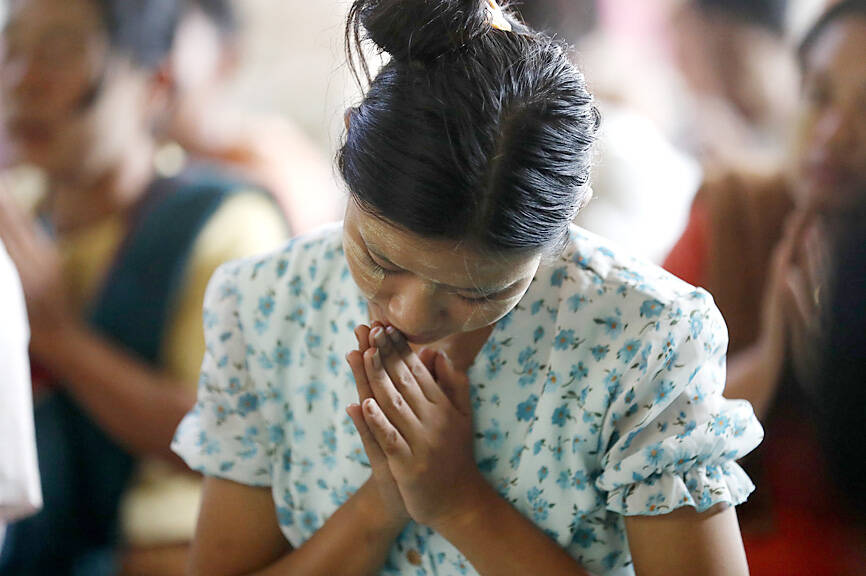Myanmar yesterday marked one month since suffering its fiercest earthquake in more than a century, with military bombardments unabated despite a humanitarian truce as thousands of survivors camp in makeshift shelters.
The magnitude 7.7 tremor was the strongest with an epicenter on Myanmar’s land mass since 1912, the US Geological Survey reported, killing nearly 3,800 according to an official toll still rising daily.
Devastation centered on the second-most populous city of Mandalay, where apartments, tea shops, hotels and religious institutes were razed or heavily damaged.

Photo: EPA-EFE
“It’s been a month, but we are still very busy trying to get back what we lost,” one Mandalay resident who asked to remain anonymous said. “I am not the only one still in difficulty, it’s everyone around me as well.”
With tens of thousands of people still homeless as monsoon season approaches, aid agencies are warning of major challenges to come.
“People are extremely concerned about what will happen in the next few weeks,” the International Federation of Red Cross and Red Crescent Societies Myanmar chief Nadia Khoury said.
She said the organization was planning a two-year relief plan because “the geographical magnitude of this earthquake has been absolutely huge.”
The military — which sparked a civil war by snatching power in a 2021 coup — declared a ceasefire to spur relief efforts starting on April 2, but since then monitors from the Britain-based Centre for Information Resilience have logged 65 airstrikes by the junta.
A strike on Wednesday last week killed five people and wounded eight more in a village on the outskirts of the town of Tabayin, 100km northwest of the earthquake’s epicenter, residents said.
“I managed to hide immediately after I heard explosions, but my elder sister couldn’t,” 40-year-old Ko Aung said. “She ran randomly in a panic during the strike and a piece of shrapnel hit her head. She died on the spot.”
Cho Tint, 46, said she sheltered in a cow shed as a fighter jet dropped two bombs.
“The military announced a ceasefire for the quake, but they broke it already and are still attacking civilians,” she said. “That’s them crossing the line.”
In eastern Myanmar residents also said they were forced from their homes in an offensive by opposition armed groups attempting to seize towns on a lucrative trade route to Thailand during the truce, due to last until tomorrow.
After four years of war, half the population were already living in poverty and 3.5 million were displaced before the quake, which sheared the ground up to 6m in places, according to NASA analysis.
Khoury said some of the badly-hit regions already had a high level of humanitarian need because they were hosting people displaced by fighting.
“Now it’s become even higher with this earthquake,” she said.
Ahead of the tremor the nation of more than 50 million was also bracing for the impact of international aid cuts following US President Donald Trump’s campaign to slash Washington’s humanitarian budget.
The World Food Programme had said it would cut off 1 million from vital food aid starting this month as a result of “critical funding shortfalls.”

In the sweltering streets of Jakarta, buskers carry towering, hollow puppets and pass around a bucket for donations. Now, they fear becoming outlaws. City authorities said they would crack down on use of the sacred ondel-ondel puppets, which can stand as tall as a truck, and they are drafting legislation to remove what they view as a street nuisance. Performances featuring the puppets — originally used by Jakarta’s Betawi people to ward off evil spirits — would be allowed only at set events. The ban could leave many ondel-ondel buskers in Jakarta jobless. “I am confused and anxious. I fear getting raided or even

Kemal Ozdemir looked up at the bare peaks of Mount Cilo in Turkey’s Kurdish majority southeast. “There were glaciers 10 years ago,” he recalled under a cloudless sky. A mountain guide for 15 years, Ozdemir then turned toward the torrent carrying dozens of blocks of ice below a slope covered with grass and rocks — a sign of glacier loss being exacerbated by global warming. “You can see that there are quite a few pieces of glacier in the water right now ... the reason why the waterfalls flow lushly actually shows us how fast the ice is melting,” he said.

Eleven people, including a former minister, were arrested in Serbia on Friday over a train station disaster in which 16 people died. The concrete canopy of the newly renovated station in the northern city of Novi Sad collapsed on Nov. 1, 2024 in a disaster widely blamed on corruption and poor oversight. It sparked a wave of student-led protests and led to the resignation of then-Serbian prime minister Milos Vucevic and the fall of his government. The public prosecutor’s office in Novi Sad opened an investigation into the accident and deaths. In February, the public prosecutor’s office for organized crime opened another probe into

RISING RACISM: A Japanese group called on China to assure safety in the country, while the Chinese embassy in Tokyo urged action against a ‘surge in xenophobia’ A Japanese woman living in China was attacked and injured by a man in a subway station in Suzhou, China, Japanese media said, hours after two Chinese men were seriously injured in violence in Tokyo. The attacks on Thursday raised concern about xenophobic sentiment in China and Japan that have been blamed for assaults in both countries. It was the third attack involving Japanese living in China since last year. In the two previous cases in China, Chinese authorities have insisted they were isolated incidents. Japanese broadcaster NHK did not identify the woman injured in Suzhou by name, but, citing the Japanese